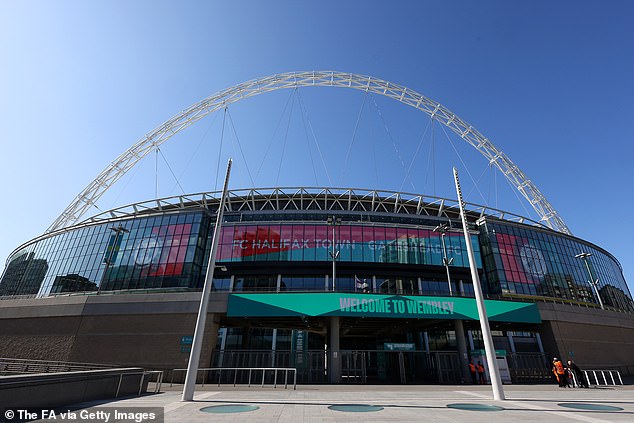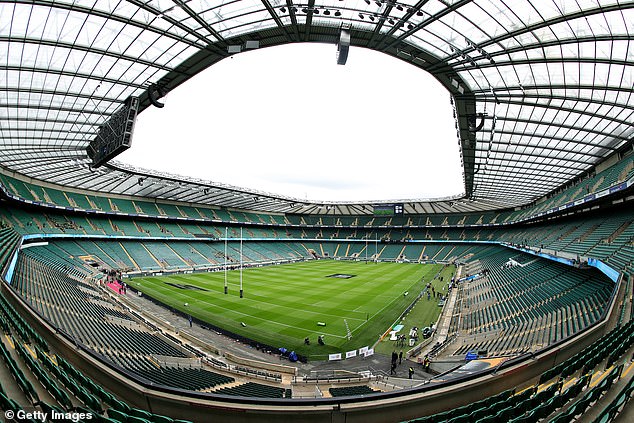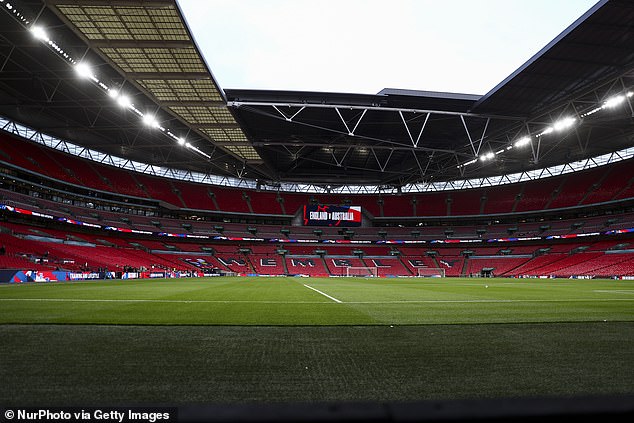- The RFU considered moving to Wembley as a contingency plan
- Union to push ahead with £300m Twickenham redevelopment
- Work is expected to begin in 2027 and last about four years
The Rugby Football Union (RFU) has abandoned plans to sell Twickenham and acquire a 50 per cent stake in Wembley from the Football Association (FA).
According The Guardian and The TelegraphEnglish rugby’s governing body considered the option as an alternative to the planned £663 million redevelopment of Twickenham.
The west London venue has been the home of English rugby since 1909 and the union has been reluctant to leave Twickenham, where matchday revenue accounts for 85 per cent of the RFU’s income.
As a result, the RFU has resisted hosting matches elsewhere, but considered moving to Wembley last year while redevelopment plans were discussed.
Wembley served as a temporary home for Wales while the Principality Stadium was being built, but has only hosted one England test match – against Canada in 1992.
The Rugby Football Union (RFU) has abandoned plans to sell Twickenham and take a 50 per cent stake in Wembley.

Wembley was considered a contingency plan as part of the RFU’s proposed £663m redevelopment of Twickenham.

The RFU will carry out a £300m refurbishment at Twickenham from March 2027.
Reports reveal that the shock move was being considered as an alternative to the stadium redevelopment proposal and was discussed in detail in a 69-page blueprint titled ‘Twickenham Stadium Masterplan Scheme’.
The masterplan reveals that the RFU board voted to retain the so-called “Leave” option last year but “defer formal engagement with the FA”.
The contingency plan has since been shelved and the RFU is pressing ahead with what it describes as the preferred way forward (PWF) in its plan.
“While the Masterplan program team has focused its efforts on developing the PWF’s ‘Remain’ option and as such has not sought to progress the ‘Leave’ option, whereby the RFU would explore the potential to dispose of the stadium of Twickenham and buy a 50 percent stake in Wembley Stadium,” the document reads.
“This was based on a recommendation approved by the board (in March 2023) to retain the Leave option as a reserve, but defer formal engagement with the Football Association and financial investment until further clarity is obtained on the viability of the Stay option and the views of the licensing authority.
The masterplan also adds that the RFU will prioritize essential works to the tune of £300m, noting that the total £663m cost of the redevelopment is currently “unaffordable”.
Under the proposals, each of Twickenham’s four stands and the roof will be renovated. The car parks surrounding the stadium will also be remodeled and the RFU offices will be relocated.
The RFU is also focusing on improving transport links to the stadium, due to chronic overcrowding at Twickenham railway station.
The refurbishment would temporarily reduce capacity to 80,000 and the RFU reportedly wants the work to be carried out between the end of the 2027 Six Nations and the start of the following year’s tournament.
Twickenham will not host any autumn internationals in 2027 due to the Rugby World Cup, with warm-up matches expected to be held across England.
The RFU hopes the stadium will be fully operational again in 2031.
“Our long-term masterplan for Twickenham Stadium is being developed to ensure England’s national rugby stadium remains up to date, complies with all relevant regulations, provides the best possible fan experiences and continues to generate income to reinvest. in the community and in the professional game,” an RFU spokesperson said.
‘Work will be carried out over the next 12 months to consider next stage designs and assess what interventions could take place and when within the existing stadium footprint over the next 10 years.

Wembley (above) served as a temporary home for Wales while the Principality Stadium was being built, but has only hosted England’s test match.
‘The RFU board has not agreed any new redevelopment plan. However, as you would expect, all options will be carefully considered as part of a long-term strategy.
‘As plans continue to develop, the RFU board and council will be fully consulted and involved in the due diligence and approval process, which would include any potential funding sources.
‘Under the RFU constitution, if a loan of more than £150m was required, the views and approval of council members would be needed. “We do not anticipate major construction on the stadium to begin before 2027.”

